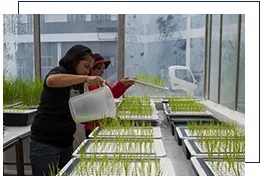
The goal should not simply be giving more food aid. It should be to ensure no aid is needed in the first place. - Bill Gates
According to estimates, global food production will have to increase by about 60 percent to meet the needs of an estimated 9.6 billion people by 2050.
However, climate change is standing in the way of meeting this estimated requirement. The UN’s Intergovernmental Panel on Climate Change says that although the effects of climate change on specific regions in the world will vary over time depending on capacity and existing social and economic conditions, the danger it poses, if left unaddressed, will have real and far-reaching consequences on global food security.

However, as the 2022 Goalkeeper’s report point out, all is far from lost. When countries and communities come together to address seemingly insurmountable challenges, ingenuity in the face of crisis breeds innovation and change, whether it is a 60 percent reduction in annual deaths from HIV/AIDS between 2000-2020, or the more recent and ongoing global recovery from a debilitating pandemic.
Making Maize Climate Proof
In sub-Saharan Africa, smallholder farmers dominate the farming community. They are dealing with challenges in growing the region’s predominant crop, maize.

Maize accounts for about 30 percent of the total calories consumed by people in sub-Saharan Africa. When temperatures rise above 30 degrees Celsius, crop growth is affected. Every additional degree per day reduces crop yield by about one percent. If the crop is exposed to five days of 35 °Celsius temperatures, up to 25 percent of the harvest is lost.
More than a decade ago, the Gates Foundation began working with a group of African crop researchers to develop a new kind of hybrid maize that could be more resistant to hot and dry conditions. When researchers in Kenya compared plots of this new maize, which they named DroughtTEGO®, with the old one, they found the DroughtTEGO® farms were producing an average of 66 percent more grain per acre. Such a harvest is adequate to feed a Kenyan family of six for an entire year. Not only that, but it also leaves the family with surplus maize they can sell for about USD880—roughly equivalent to five months of earnings for the average Kenyan.
Protecting Rice and Wheat
Similar agricultural innovations are happening in other parts of the world, including India’s Punjab. The state’s farmers grow two of the country’s staple crops: wheat in the dry northern Indian winter, and rice in the wet season. However, changing weather patterns due to climate change are upsetting their livelihood.

In both 2010 and 2015, the early onset of high temperatures turned the wet season into a dry one, thereby ‘overcooking’ the paddy crop. Local farmers partnered with the Punjab Agricultural University to find an alternative, more resilient solution: a ‘short-duration’ paddy variety that needed fewer weeks in the field. It could then be harvested before the onset of heat waves, caused by climate change, which could destroy the crop.
Another innovation, by Cereal Systems Initiative for South Asia (CSISA) in close partnership with government authorities and local agricultural institutions, has succeeded in advocating for timely rice and wheat planting. Its research has led to a significant increase in early sown wheat across 45 districts in Bihar and Eastern Uttar Pradesh (EUP)— a factor that plays a key role in bolstering agricultural productivity. In fact, CSISA data from the kharif 2021 and 2021-22 seasons indicate that farmers across EUP and Bihar who adopt best practices can achieve system yields of 12 to 15 tons/hectare, comparable to the typical yields seen by farmers in Punjab and Haryana.
Advancing Food Security
These positive developments are not limited to rice and wheat. The Indian Agricultural Research Institute (IARI) in Pusa, New Delhi, is currently growing drought-resistant next-generation chickpea plants.
Chickpeas, much like wheat and rice, are also a staple crop in India. They provide many smallholder farmers with an important source of income, and families across many parts of the country rely on chickpeas for their daily nutrition. But climate change poses a threat to its harvest. Higher temperatures can reduce yields by as much as 70 percent, putting livelihoods, health, and lives at risk.

<span id="callout" class="container-callout" fs-test-element="callout">In mid-June 2023, the Government of India released additional chickpea varieties resilient against drought and wilt. The result of genomic assisted breeding to fast-track the development of climate resilient crop varieties, these can produce an average yield of 2-2.5 tons/hectare and mature in under 130 days."</span>
The Gates Foundation is supporting the government through our partners, focused on advancing the cause of food security to support the IARI researchers’ work.
Their work involves a first-of-its-kind, genomics-assisted breeding of chickpea varieties in partnership with the Indian Council of Agricultural Research (ICAR). This has enabled India to launch four improved drought-tolerant and disease-resistant chickpea varieties in record time. The result of a successful collaboration between ICAR institutes, state agricultural universities and the International Crops Research Institute for the Semi-Arid Tropics (ICRISAT), genomics interventions in crop breeding promise to significantly enhance productivity of important legumes like chickpeas.
Such innovations in technology and solutions promise to mitigate the threat posed by climate change to farmers and crop yields.

